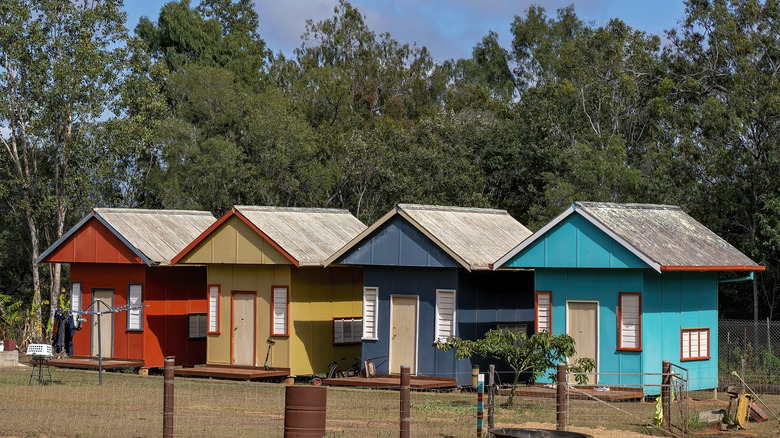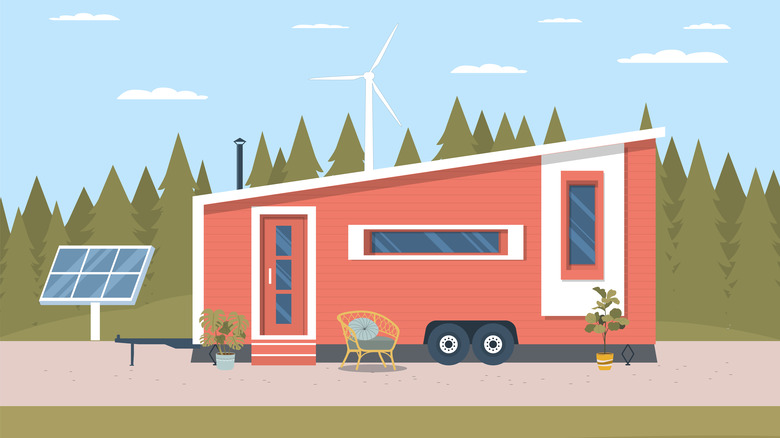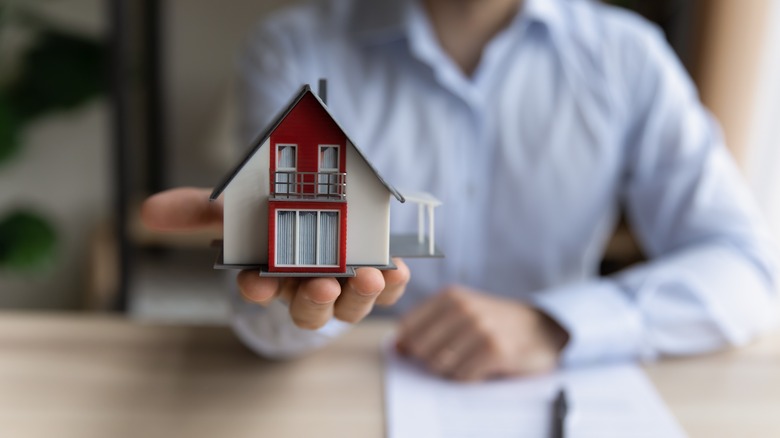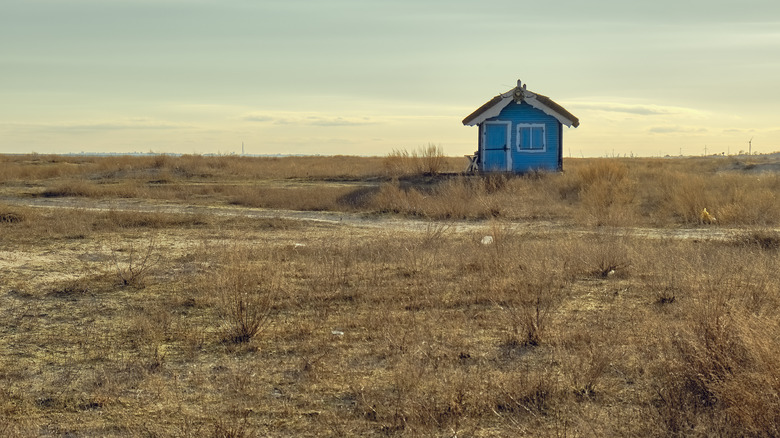Do Tiny Houses Really Save You Money?
The idea of a tiny house might sound strange to some. Owning a tiny house means that you'll have to forego some of the standard amenities that a homeowner has typically come to expect from their property. Tiny houses incorporate less storage space than traditional properties, but they also demand far fewer pieces of furniture as a result of their diminished household footprint (via ExtraSpace). This and many other aspects of the differences between traditional and tiny houses make them a potentially money-saving opportunity for homeowners who don't need all that additional space in their living quarters.
A tiny house allows you to live a life more in tune with the ideals of minimalism. With a smaller home, you have to really think about whether a new belonging serves a purpose in your life or not. Tiny houses offer an incredible asset when it comes to rejecting overspending on furniture, groceries, and much more that factor into life in the modern world. This can be great for your finances and lifestyle, but not everything about the tiny house model will be for everyone.
A tiny house brings about challenges of its own, and in some regards, it won't actually save you the huge volume of money that you might expect. Continue reading to learn more about the financial benefits and challenges that a tiny house brings to bear.
A tiny house's price tag is certainly lower
The initial price tag of a tiny house is dwarfed by the average cost of an American home in the modern marketplace. While Rocket Mortgage reports that the average tiny house cells for somewhere between $30,000 and $60,000, the St. Louis Federal Reserve Bank reports that average home sales in the third quarter of 2022 put the price of a typical real estate property at $542,900.
These figures lie in stark contrast to one another, to say the least. However, it should be noted that Rocket Mortgage also suggests that some of the most expensive and luxurious tiny homes can sell for $150,000, and the average homeowner looking to incorporate more than just a baseline property will likely need to spend more than the typical range. Even so, a tiny home will give you an enormous edge when it comes to purchasing luxurious upgrades and amenities that are included in your property. The price tag alone entices many people to opt for a tiny house instead of a more traditional home footprint.
Rocket Mortgage also notes that if you decide to build your own tiny house instead of purchasing a prebuilt one, you are likely to take advantage of additional savings opportunities. This means that you can customize the upgrade features that are included in the home, further minimizing unnecessary expenses and establishing a layout that works for your specific lifestyle needs and spatial demands.
Utility costs are reduced
Of course, in addition to the initial price tag of a tiny house, the utilities that will be used to facilitate your lifestyle are going to be less costly as well. A tiny house won't use as much electricity or gas as a standard home (via The Tiny Housing Co.), and often, people who own tiny houses are individuals or small families who prioritize sustainability, so they use less water, too.
With the smaller square footage of your living space comes a noticeable reduction in the cost to maintain the property. This notches another financial benefit in the column of the tiny house. However, it should be noted that there are many strategies that owners of a traditional home can deploy in an effort to reduce ongoing utility bills. This means that some of the benefits that are involved in this regard may be minimal when it comes to making the switch to a tiny house. Even still, it's undeniable that a tiny house will cost less when it comes to utilities and services.
Tiny homes include many hidden costs that can really add up
However, there is a major caveat in the outgoing expenses of a homeowner who lives in a tiny house. Even as electricity bills may be minimized, the owner of a tiny house will likely need to pay lot fees or other parking charges to keep their home situated in its environment. All About Tiny Houses notes that homeowners who live in tiny houses also likely can't take advantage of the natural tax benefits that a traditional property can provide.
All About Tiny Houses reports that a tiny house can't be factored into your tax deduction math because a tiny house isn't secured to the ground, and therefore doesn't count as a traditional real estate asset (instead being classified typically as a recreational vehicle for tax purposes). This can be a real burden and come as a shock for someone who doesn't know about the nuanced behavior of real estate assets in tax planning circumstances.
Similarly, because a tiny house can be moved, you may want to move your home from time to time to take advantage of cheaper land rates, new scenery, and more. Moving a tiny house can be a substantial expense though. To make this transition, you'll either need to own your own vehicle with considerable torque and towing capacity or hire a professional to haul away or lift and relocate your house to a new space.
A tiny home enjoys tiny resale value addition
One thing that can't be avoided is the minuscule resale value that a tiny house is burdened with. Tiny houses fit within a niche market to be sure. And therefore, it can be difficult to sell a tiny house that you've outgrown or simply want to upgrade to a new model. Because a tiny house is more like a vehicle than a rooted property, you might want to upgrade from time to time, even if you're sold on the concept of living in a tiny house for the long haul. Whether you're trying to change out your model for an update or have reservations about whether or not a tiny house will continue to fit your lifestyle moving into the future, selling the existing house that you live in can be an uphill battle, to say the least.
Even if you are able to list your property and attract interested buyers with ease, it can be difficult to move the asset for the price that you're asking because its fabrication is more like a mobile home or car, and therefore depreciates in value and utility over time rather than gaining financial value like a traditional property (via Outdoor Troop). Similarly, tiny houses are typically customized to the owners' specifications. This means that your home is perfectly suited to your lifestyle, and this nuanced set of needs and layout features may not be replicated in the search parameters of others who are looking for their own tiny house.
Tiny homes: A mixed bag of financial circumstances
The bottom line is that a tiny house may save you a substantial amount of money in the short term, but there are some significant trade-offs that must be made. For one thing, buying a tiny house may involve sinking your money into an asset that you cannot resell at a later time (or take a substantial loss on). Unlike a traditional home, a tiny house may amount to a straight purchase rather than an investment. This reality certainly changes the dynamics of the financial calculation that a home buyer must consider.
Even still, a tiny house can provide a unique sense of mobility and lifestyle freedom (via Tiny House Expedition). By living in one, you can get away from the grind of life that so many homeowners find themselves falling victim to. The ability to move your home to a new community or even across the country to a new state makes living in a tiny house a wonderful opportunity that pays you back in experiences and adventure. This intangible dimension of tiny house living means that it's entirely possible that even if you can't resell your tiny house after deciding to move on, the investment was still worth it.
At the end of the day, a tiny house likely will not save you a large sum of money because the property does not act like a real estate investment, but this doesn't mean it can't still be worthwhile.





